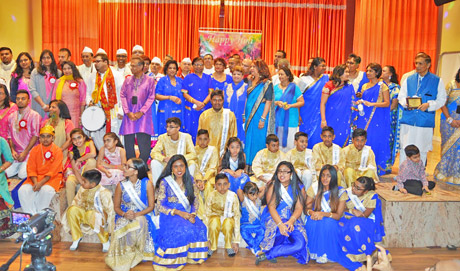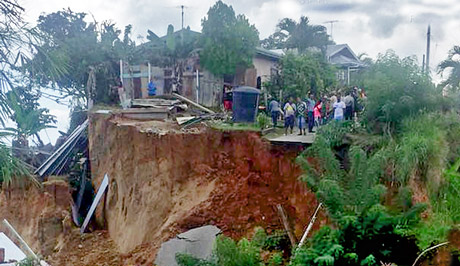Cultural Association

By Jay Jaggassur
Holi is undoubtedly the festival that elicits the most fun and excitement in the Hindu tradition. Known for involving both young and old in an atmosphere of revelry and light-heartedness the festival transcends all communal barriers with singing, dancing, eating, drinking and general merry-making topping the list of activities.
Such was the ambience created by seven vibrant groups of young people who came together under the aegis of the newly formed Ontario Hindu Cultural Association to celebrate Holi and deliver some of the festival's characteristically reverberating chowtaal songs.
The Ontario Hindu Cultural Association was formed to promote Hindu festivities in Canada and to transmit to the new generation the rich culture heritage of its forebears.
The first event organised by the Association was this Grand Holi Sammelan on February 24, 2018 at the Hindu Heritage Mandir in Mississauga. Under the leadership of Shaw Jaundoo, one of the Association's founding members, various groups joined together to produce a wonderful mix of singing styles.
Participants of this Holi Sammelan were: Saraswati Prakash, Devi Mandir, Kabir Association of Toronto, Radha Krishna Mandir, Debe-Penal Group, Sewa Youth Arms and Sanatan Dharma Sangeet Mala.
The program started with opening prayers by Pandit Gopie, Pandit Jagdesh Maharaj Harrypaul and Pandit Shastri. Executive members of the Association were then introduced, followed by a speech by the President Shaw Jaundoo. Soorajnie Jaundoo and Karna Persaud were the anchors for the day.
In their Chowtaal singing each group was unique in its own way although all the groups followed the dhamaal style. They performed at different speeds and momentums reminiscent of the folk singing of the Indian subcontinent.
The participants originated from different backgrounds: India, Pakistan, Mauritius, Guyana, Trinidad & Tobago and Zambia, which accounted for the variety of styles portrayed.
Each group was awarded a plaque in recognition of their participation in this inaugural event.
The program was also punctuated by songs and dances. The singers and dancers, all in their teens, amazed the audience with their wonderful performances. The event concluded with a wonderful resonating tassa performance that brought everyone to their feet, moving to the pulsating rhythms of that magic instrument.
The Ontario Hindu Cultural Association looks forward to organise more such events to commemorate Hindu festivities in Toronto and its environs.

Also affected was Leroy Joseph, who lived there with his wife and four children, their house located 20 feet from where the main damage occurred. Joseph, 69, said he heard a loud noise, and on investigating was in time to see his animal enclosure tumbling down the cliff. This was around 1 p.m. last week Monday.
“The fowl pen went down clean. The cesspit gone. In front of me there was a house gone clean. I feel it was an earthquake that passed. We started to clear out when we saw the neighbour’s house gone,” Joseph said.
The area was declared “a disaster zone” that Monday night by Siparia Regional Corporation chairman, Glenn Ramadharsingh. Later, local government councillor for Cedros, Shankar Teelucksingh, and other officials, advised several residents to leave their homes, opening up the Cedros Community Centre as a temporary shelter.
In the following days, at least 65 persons were evacuated, many of them spending the week with neighbours and relatives.
Senior Fire Service officer Keith Seebaran described the collapsed land as a “sinkhole” and imposed temporary restrictions on access to the deteriorating village. He said at least 18,000 square metres (60,000 feet) of land had collapsed downwards into the ocean, and there was more to follow.
In a visit to the area last Thursday, Prime Minister Keith Rowley informed residents the village had to be abandoned. The damage was beyond repair, he said. He added arrangements were being made for temporary housing, with long-term measures for permanent relocation.
Rowley noted erosion such as this was occurring on every headland along the south-western peninsula. Such land movements were a natural phenomenon, placing those in danger who are living close to the sea.
“Everyone saw the cracks. We are very lucky that these houses collapsed, and we did not have any loss of life or limb. To avoid that possibility, we have to restrict here, both in the interim and the long term,” he told residents.
Additionally, “This is not ordinary landslip; it is no ordinary coastal erosion. This is a large chunk of land. It is not stable, and it is going to move until it gets into the sea.”
While he sympathised with the residents having to leave their homes behind, he added it was more important to save lives than houses.
“This hill is going down to the sea,” he said, adding that to assess it from the ocean was to note the erosion of each headland across the coast.
“When you are coming from the sea you see them all the way up – scars, and this thing going on long time. It’s a geological phenomenon. This whole bay is a result of this kind of action. This is way beyond any single action. It’s a natural phenomenon, they have been living on it for a while. I am thinking about eight or nine scars like this,” he said.
Rowley noted a similar situation was developing on the Manzanilla coast. “This used to be a very beautiful place to be to watch the moonlight on the ocean, but now it is no more,” he said.
Over the weekend, 12 families that lost homes were waiting for housing accommodation. Teelucksingh said this week eight evacuated families would know whether they will be given temporary accommodation at the HDC’s Lakeview Housing scheme in Point Fortin. He said the Land Settlement Agency had not yet discussed permanent settlement for the affected families.
Since the calamity, Teelucksingh said assistance has been provided by corporate Trinidad and Tobago, the Penal/Debe Regional Corporation, Toco/Sangre Grande Regional Corporation, and the Couva/Talparo/Tabaquite Regional Corporation. He added two private landowners from Ramdhanie Development and Perseverance Estate Development had indicated willingness to discuss relocation with the LSA.
The Gunness family, whose house was the first to tumble down the 1,000-foot precipice, said they were eager to get the relocation process going.
“Right now, nobody cannot sleep. Two families are in the community centre. Some of us staying by relatives, but every night we just walking the road, praying that nothing else happens,” said family head, Anthony Gunness.
Over the years, Deomatie Mohammed remained in Cedros while most of her siblings moved out. She did so through love of the sunsets suffusing the Gulf of Paria, cherishing this as a special moment each evening from what was once her backyard.
“It is not easy. What is that word? Migration? Leaving here is very sad. It is taking a toll on us. We may not show it; probably reality hasn’t hit us that we have to move. Maybe because we are still staying in the village by neighbours it hasn’t hit us. Maybe when we start to actually move out and have to wake up somewhere else, then it will. Then we will know that something really wrong,” she said last week.


